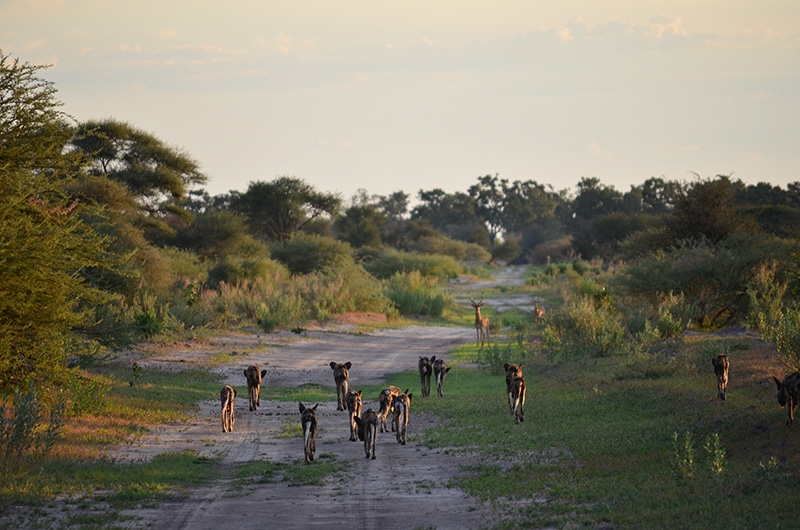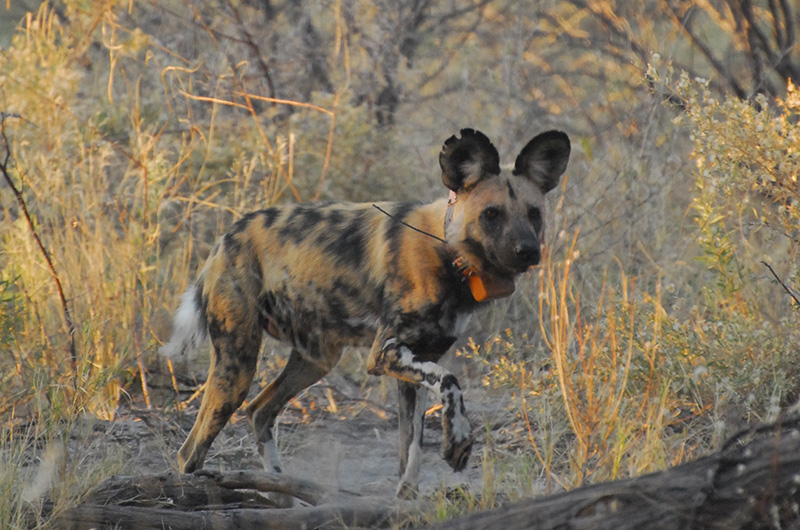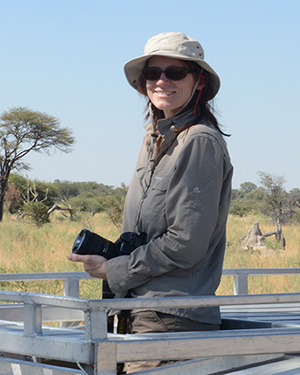New study reveals hunting strategy of remaining populations of endangered African wild dogs
A new study by researchers at the RVC's Structure and Motion Laboratory and Botswana Predator Conservation Trust has revealed that African wild dogs in mixed woodland savannah habitats may be more energetically robust than previously thought, due to their hunting strategy of frequent, opportunistic, short chases. This new information will help the conservation of this endangered species.
In two papers published together in Nature Communications, the group use high-resolution position and speed data collected by custom-built GPS collars to reconstruct hunt behaviour of an entire pack of African wild dogs in northern Botswana. The data showed short, individual high-speed chases. The pack showed no evidence of cooperative hunting beyond travelling together and sharing the kills made by an individual dog. The dogs did not hunt in any special formation, nor did they have specialised roles in the chase.

An energy balance model was used to calculate the energy return from a hunt. Contrary to common conceptions about African wild dogs living on a knife-edge in terms of energy balance, this particular hunt strategy gives the dogs a surplus of energy to live and support young.
Understanding the hunting strategies of a species helps conservationists to identify which areas should be protected or where new populations can be re-introduced most successfully.
Most previous studies have been done by direct observation in the grasslands of East Africa, where African wild dogs have been described as the ultimate collaborative endurance hunters, pursuing prey over long distances and working together to make a kill. Since multiple dogs invest a large amount of energy in a single prey, there is a high cost if they miss or lose the kill through kleptoparasitism (theft of kill by another species). More recent knowledge of the distribution of the remaining population of the highly endangered African wild dogs shows they live mostly in mixed woodland savannah, which makes direct observation difficult.
This new study by the RVC and the Botswana Predator Conservation Trust is unique because the researchers were able to track entire hunts despite dense vegetation and low visibility. Using GPS-IMU (inertial measurement unit) tracking collars to record fine-scale movements of all pack members during the hunt, this study has produced the first conclusive dataset for position and speed of an entire pack.

The collars, built in-house at the RVC, have a unique dynamic sampling system that responds to how much the animal is moving. During periods of low activity, the collar records a GPS fix once every hour. During moderate activity, the collar records a signal once every five minutes, moving up to a sampling frequency of 5 Hz (5 fixes every second) and adding data from an onboard gyroscope and accelerometer when the accelerometer senses a chase. This gave researchers round-the-clock information on activity and ranging, and detailed insight into entire chases.

Lead researcher Dr Tatjana Hubel says: “We know almost every step these animals have taken over the course of 5 months. We know how often and where they run as well as how fast and manoeuvrable they were.”
Using collar data such as hunt distance and kill rate, as well as factors including pack composition and estimated prey intake, the researchers used a model to balance the energy gained from a kill with the energetic cost of hunting. The model revealed that the energy return from group feeding more than outweighs the cost of multiple short chases, so the African wild dog is more energetically robust and less susceptible to kleptoparasitism than previously thought.
To compare the energetic costs and returns of this opportunistic hunting strategy with the more athletic, high-investment hunting strategy of the cheetah, the group also populated their energy balance model with data collected from free-ranging wild cheetahs in the same study area. They found that although an individual cheetah is more successful than a single African wild dog, the ratio of energy gain to energy cost for the whole pack is twice as high as that achieved by the individual cheetah. This illustrates the trade-off between sheer athleticism and high individual kill rate characteristic of cheetahs, and the energetic robustness of frequent opportunistic hunting and group feeding by African wild dogs.
This study was funded by the European Research Council, Biotechnology and Biological Sciences Research Council, and Engineering and Physical Sciences Research Council and with the kind permission of the Government of Botswana. The Botswana Predator Conservation Trust is supported by grants from the Paul G. Allen Family Foundation, Wild Entrust International, Tusk Trust and private donors.
Video
Press Office Contact
Uche Graves / Zoe White
T: 0800 368 9520
E: uche.graves@plmr.co.uk / zoe.white@plmr.co.uk
Notes to Editors
The Royal Veterinary College (RVC) is the UK's largest and longest established independent veterinary school and is a constituent College of the University of London. The RVC offers undergraduate, postgraduate and CPD programmes in veterinary medicine, veterinary nursing and biological sciences, being ranked in the top 10 universities nationally for biosciences degrees. It is currently the only veterinary school in the world to hold full accreditation from AVMA, EAEVE, RCVS and AVBC.
A research-led institution, in the most recent Research Excellence Framework (REF2014) the RVC maintained its position as the top HEFCE funded veterinary focused research institution.
The RVC also provides animal owners and the veterinary profession with access to expert veterinary care and advice through its teaching hospitals; the Beaumont Sainsbury Animal Hospital in central London, the Queen Mother Hospital for Animals (Europe's largest small animal referral centre), the Equine Referral Hospital, and the Farm Animal Clinical Centre located at the Hertfordshire campus.
RVC Press Release 29 March 2016
See other .
You may also be interested in:
-
ÌÇÐÄVlogApp™s Professor John Hutchinson elected Fellow of prestigious Royal Society
John Hutchinson, Professor of Evolutionary Biomechanics at the Royal Veterinary College (RVC), has …

